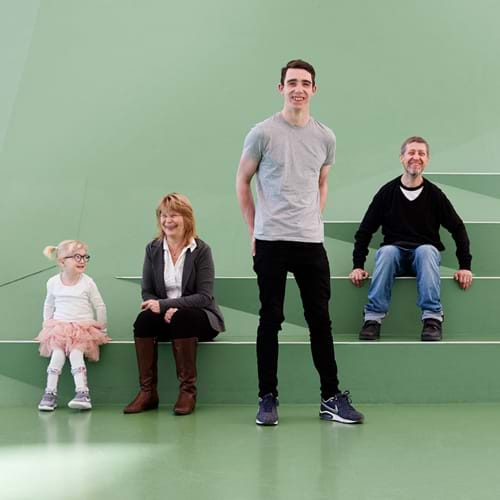Cerebral Palsy and Cognitive Challenges
People living with Cerebral Palsy (CP) may experience cognitive difficulties that can lead to challenges in everyday life. However, there are several things that can be done to minimize the impact of these cognitive difficulties.
While CP in some cases only affects motor function; in others it can also result in cognitive difficulties.
Typically, a distinction is made between specific and general cognitive challenges. In the case of specific cognitive challenges, certain cognitive areas are affected, such as memory or attention. General cognitive challenges have a broader impact and are commonly described as affecting overall intelligence.
The term ‘cognitive difficulties’ does not cover psychological disorders such as stress, depression, and anxiety. However, some mental health conditions can affect cognitive abilities.
How many people with CP have cognitive difficulties?
While not all individuals with CP face cognitive challenges, approximately 30-40% of them may encounter general cognitive difficulties. However, the scientific documentation regarding this statistic remains unclear. Furthermore, a significant portion of those with CP may encounter specific cognitive challenges.
People with all subtypes of CP and degrees of motor impairment can experience cognitive difficulties.
In general, there is a relationship between motor and cognitive function. The more a person’s motor skills are affected by CP, the more likely they are to experience cognitive difficulties. However, the relationship is not straightforward, and there are many exceptions. This means that one cannot assess a person's cognitive level solely based on their motor skills.
WHAT IS COGNITION?
Cognition describes a collection of mental processes we use to think, to guide our actions, and to interpret sensory input from the surrounding world. These processes always occur as an interaction between the brain, body, and surroundings.
For example, try to remember your debit card PIN code. This can be challenging at times. However, when you are standing at a credit card machine, where you can physically enter the code, it suddenly becomes easy.
How are cognitive challenges typically experienced?
The extent and nature of cognitive difficulties in individuals with CP can vary significantly. For some, all cognitive domains may be affected to varying degrees, while others may only experience effects in specific domains or experience no difficulties at all.
Some of the cognitive functions most commonly impacted in people with CP are:
Arousal
The term arousal encompasses various degrees of a person's alertness, ranging from fully awake and attentive to drowsy or asleep. A sufficient level of arousal is necessary to engage in activities and to make the best use of cognitive functions. Some individuals with CP may need help from others to regulate their level of arousal.
Processing Speed
The speed at which sensory input and thoughts are processed is referred to as processing speed. In the case of slow processing speed, it can be challenging, for example, to chime in with a comment during a conversation before it has moved further along.
Perception
Perception refers to the ability to take in and process sensory input and transform it into information that can guide our actions. CP can affect tactile function and spatial awareness, which in turn affects motor skills. Additionally, CP often affects the ability to process visual information. This can occur due to issues either with the eye itself or with the brain's processing of input from the eye (referred to as Cerebral Visual Impairment, CVI). The latter is typically challenging to detect in a routine eye examination.
Attention
Our attention helps us focus on the most relevant information in a setting. It allows us to focus on a specific task and filter out distractions. It also helps us to remain focused during long-lasting activities and when managing several tasks simultaneously.
Executive Functions
Executive functions are functions that regulate fundamental cognitive, emotional, and behavioural processes to achieve a higher level goal, such as cognitive flexibility, impulse control, and the ability to plan. Executive functions develop continuously throughout life, so they are not fully matured in children.
Signs of Cognitive Challenges
Cognitive challenges can manifest in various ways in daily life, depending on the environment and the expectations a person encounters. As a result, they may be perceived differently by individuals who interact with the child or adult with CP.
These challenges can affect:
- The ability to engage in relationships
- Participation in everyday activities
- Participation in school, education, or work-related activities
It is usually very clear to parents and caregivers when a child or adult faces significant cognitive challenges. However, if the person experiences mild, specific cognitive challenges, they may be more difficult to detect. This is especially true for children, as cognitive challenges usually become more pronounced with age.
A common sign of mild cognitive challenges in a child is when they struggle to adapt to and complete tasks or activities that are appropriate for their age. In this context, it is important to consider whether these challenges are due to motor or cognitive difficulties.
For example, a 5-year-old child with CP may struggle to put on their jacket because it is difficult for the child to use one of their arms. This is a motor skill difficulty. However, if the child also has trouble figuring out how the jacket should be oriented or what to do first, the struggle might be due to difficulties in processing visual information or the ability to plan.

Can cognitive challenges change over time?
Cognitive difficulties can become more pronounced as the brain matures and demands or expectations from the environment increase. This is partly because cognitive abilities develop at different rates. Some develop early in life, such as visual processing, while others continue to develop over many years into adulthood, like the ability to maintain perspective and the ability to plan.
For example, a young person with CP may find it challenging to keep up with lessons in larger classes or in a higher education setting, even though it wasn't a problem earlier in their life. This could be because their executive functions aren't developing in the same way as their peers, while academic demands and expectations for independent work are increasing.
How do you determine if a person has cognitive challenges?
There are several ways to find out if a person with CP is experiencing cognitive difficulties. Observations from everyday life can provide valuable information. It can also be helpful to undergo a structured cognitive assessment.
For people under 18, this type of assessment is often conducted by psychologists from the Educational Psychological Guidance (Pædagogisk Psykologisk Rådgivning; PPR) services in municipalities. In some places, cognitive assessments are performed regionally at hospital paediatric departments. If there is a need for specialized knowledge that is not available locally, the psychologist from PPR can refer you to the National Knowledge and Special Counselling Organization (Den Nationale Videns- og Specialrådgivningsorganisation; VISO).
Adults can seek guidance from the academic counselling services at their educational institution, their primary care physician, or a caseworker to learn more about options for support or to assess the need for a neuropsychological examination. It is also possible to contact CP Denmark and the Elsass Foundation for advice and information about resources.
Ways to manage cognitive challenges
Cognitive difficulties cannot be cured, but their impact on everyday life can be reduced. Cognitive functions develop through everyday activities like playing, participating in social interactions, and performing daily household tasks.
For individuals with CP, a more targeted approach may be necessary. In this context, the following factors may be relevant:
Meaningful Contexts
If an activity is challenging, it's best to practice the element that makes it difficult, preferably in a meaningful context. For example, if a child struggles to remember how to put on clothes in the right order, it's better to practice when getting dressed in the morning, rather than in an artificial situation that doesn't make sense to the child.
Motivation
Motivation is an important driving force behind our actions. When an action is important and meaningful to us, we are generally more motivated. Motivation increases the likelihood that we actively engage and stay focused on an activity, and it ultimately determines how much we learn.
Personal Experience
The opportunity to engage in activities and gain personal experiences is important – both when things succeed and when they don't. When you perform an action, feedback is sent to the brain about whether the action succeeded as intended or if adjustments are needed. This means that there is significant learning potential in being allowed to make mistakes.
Prioritizing Objectives
Most activities throughout the day are complex and challenge multiple cognitive abilities simultaneously. It can be useful to choose what is most important to practice in a specific activity and minimize demands on less critical aspects of the activity. For example, is it more important for a child in the 1st grade to learn to write letters with a pencil, or is it more important for the child to learn to spell and use a computer to help manage difficulties with motor skills?
Where can you find help?
At the Elsass Foundation, we offer services to help manage cognitive difficulties. You can stay informed about our activities by visiting our events page or by subscribing to our newsletter.
If you live in Denmark, there are other places to seek help:
- Educational Psychological Guidance (Pædagogisk Psykologisk Rådgivning, PPR; referral through institution/school)
- The National Knowledge and Special Counselling Organization (Den nationale videns- og specialrådgivningsorganisation, VISO; referral through PPR)
- CP Denmark
- The State Educational Support (Statens uddannelsesstøtte) website (for applying for disability benefits during education)
- The Danish Authority of Social Services’ (Socialstyrelsen) program "Children and young people with complex consequences of cerebral palsy"
- Academic counselling at your educational institution

